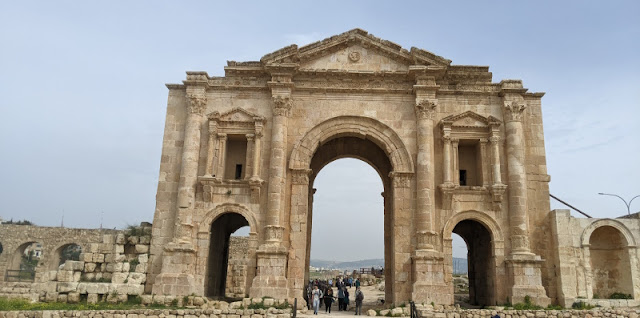Day 7 - Wednesday, March 15, 2023 - Yad Vashem and Bethlehem
The wind was howling last night but not raining right now. Hopefully it will not pour.
It was probably fitting weather to visit Yad Vashem, with foggy, drizzly and chilly weather. Yad Vashem is the world's largest holocaust museum which depressingly documents the atrocities of the holocaust. It is hard for us to imagine how human beings can treat fellow human beings with such disregard for life. It was not just German Nazis, but many anti-Semites and regular neighbors of the Jews, especially in the Eastern European counties of Poland, Latvia, Lithuania, Estonia, Ukraine and Romania. Denmark was remarkable in helping all Jews escape to Sweden as they were "Danes" and deserved assistance.
Before we went into the museum, Yonatan, shared with us his family history as holocaust survivors and victims. Using their wits, his mother and her parents in 1938 managed a perilous journey from the Sudetenland after annexation by Germany, to Prague, Italy, France, Wales and finally the US. They were stopped numerous times and could have been sent to concentration camps. After his mother died, he found original documents from his great-grandfather to relatives in the US, of the US agreeing to accept his family and German transit documents with Nazi stamps. During the pandemic he was able to analyze many of the documents to assemble this family history and donated the original documents to the archives of the Holocaust Museum in Washington, DC.
From there we took the bus to Bethlehem which is a short distance from Jerusalem, taking less than 45 minutes, where we met "Fadi", our Palestinian guide. We had a delicious Palestinian lunch of salads, grilled lamb and chicken, beer, Turkish coffee and baklava for dessert.
It was another short ride to the main bus station and a short walk up to Nativity Square. The Church of the Nativity is the oldest Christian church and it's construction was started in 326 after a visit by Emperor Constantine's mother Empress Helen's visit to the holy land. She declared this the site of Jesus' birth. It was destroyed in the 6th century during the Samaritan Revolt against the Romans and then rebuilt by Emperor Justinian the same century. During the 12th century it was used for the coronation of the crusader kings. It has had many ups and downs over the centuries, especially during Ottoman rule when horses were kept there.
We were able to see mosaics under the floor which were original from the Byzantine church in the 4th century and massive roof timbers of cedar from Lebanon. We climbed down narrow stairs to a marker indicating where Jesus was born and a niche where the manger was. We were told the original manger is in Italy. I take this all with a grain of salt although one does have a special feeling in the place.
On the other side of Nativity Square is a Muslim mosque. It was starting to rain and we didn't spend much time there, quickly walking back to the bus. At a souvenir shop in the bus station I bought a small vial of "nard", an essential oil. This is the precious oil that Mary Magdalene used on Jesus feet before his crucifixion.
It was a short trip back to the hotel with an uneventful stop at the Israeli checkpoint. The guard asked everyone to hold up his/her passport but even before many people got the passports out, waved us us.
Back at the hotel, Yonatan gave an "extra credit" walk around the neighborhood of the hotel, going past the prime minister's residence, the president's residence, where Yonatan first lived with family when he came to Israel and many beautiful houses, some of which are now used as a consulate and school. These were originally private homes of the wealthy.
Dinner was at the hotel with a talk by "Fadi". Fadi is an Arab Christian Israeli attorney who is the CEO of the Jerusalem YMCA. He is a very personable and open-minded speaker. Growing up in Haifa, his parents sent him to a Hebrew school, much better than the Arabic schools where he was the only Arab in his school - a challenge for a young boy.
He discussed the complexities of the Arab situation. The Arabs are mainly Muslim but there is a significant Christian population and a small Druze population. Geographically, there are Israeli citizen Arabs in Israel, Arab residents in the annexed East Jerusalem and Palestinian Arabs in the West Bank, all of which live under different systems and rights. Arab Israeli's can vote and have most of the rights of Israeli citizens although recent legislation is making them secondary citizens. The East Jerusalem Arabs can not vote and don't have passports which makes travel very difficult. Palestinian Arabs have no rights in Israel and can't easily travel through Israel.
Fadi strongly supported his Arab culture but also felt that it was very important for Arabs and Jews to interact more closely with each other. He runs a school with a mix of Arab and Jewish students.
Fadi was very concerned about the future of democracy in Israel with the current push of the conservative to control / weaken the supreme court, removing the checks and balances of of society. It isn't clear what will happen if the supreme court rules against the legality of recent undemocratic legislation but the ruling is not enforced. This the biggest concern in Israeli society today which is resulting in massive demonstrations.
 |
| Altar of the Greek Orthodox portion of the church Jesus birthplace is underneath, with stairs to the right. The Armenian portion is to the left. |
 |
| Site of manger |
 |
| Byzantine mosaic from 4th century |
 |
| Church entrance |
 |
| Mosque at opposite side of Nativity Square |




Comments
Post a Comment